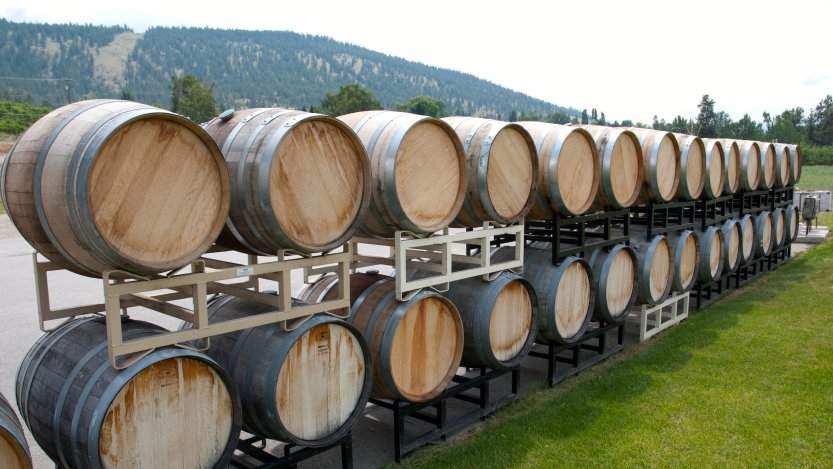Many of us know a bit about the different grapes and have heard about the health benefits of wine, but here are a few things you may not know about wine, from that wine headache you get to the price to pay.
Photo by Thomas Quine on Flickr.
Wine making is high-tech
Ah, the noble Vigneron, toiling in his vineyard with the sun on his neck while his trusty mule lugs wicker baskets full of grapes he’ll press later that day. Nope. Those days are gone almost everywhere.
Winemaking has gone high tech. DNA profiling is used to determine the ancestry of grapevines and to determine what is actually planted in vineyards. It used to be done by highly trained professionals who would compare by looking at the bunches of grapes and the leaves of grapevines to figure out what was planted. Satellites and high-flying aircraft use sophisticated software to analyze the soil and micro climates of vineyards to determine precisely where the ideal locations for certain grape varieties should be. And, almost every winery does some lab testing to make sure the wines you buy these days are free from microbial contamination, are stable, and yes, safe to drink.
You're paying for the price of the land
Sure, you might be a savvy enough wine drinker to know where you can find a good bargain in wine, but you might be surprised to find out why those bargains exist. Typically, it’s due to economy of scale; bigger wineries can produce wine more cost effectively. It’s why E & J Gallo can produce a decent bottle for under $10, but why you can’t get a great bottle for that made in Canada.
The cost of land influences your wine dollars too. Imagine for a moment that you had a few bucks kicking around when you saw a vineyard and country home for sale. Now, let’s pretend that each one of those acres makes top-shelf grapes and produces about two tonnes, and each tonne of grapes is worth, let’s say, a very healthy $2,000, which you sell right away. You'd be bringing in about $5,600 per month, but spending more than $6,000 on land, and that's before labour, interest, any sort of capital equipment, or even any sort of insurance. Straight up vineyard land can run anywhere from $30,000 an acre up to around $200,000.
Your wine headache is not a thing
Now, I’m not a medical doctor so don’t construe this as medical advice or diagnosis. But, you are probably not allergic to sulphites and they certainly don’t give you headaches. Some amount of sulphites is present in almost every single bottle of wine out there, but certainly not in sufficient quantities to give you a headache. In addition, sulphur is often used to help “stabilize” wine during its manufacturing, so that the wine you buy tastes like it was meant to by the time you open it. A small number of asthmatics react to sulphites -- asthmatically, no less -- and the United States, in its infinite wisdom, mandated a warning to appear on labels. If wine gives you a headache, it could be related to any number of things, including a mild reaction to histamines, like hay fever. And, I’m not going to ignore that there can be a psychosomatic effect, too.
It may be all in your head.
You don’t have to spend a lot of money to get good wine
There, I’ve said it. I’ll also say that it is very hard to actually go out and buy a bad bottle of wine nowadays. Sure, there is wine you don’t like, but even the meanest plonk today is probably better than the crap your parents drank when you were growing up. If you are willing to spend about 10 bucks or more, you can find something decent, with the sweet spot at around $15 to $50 for some pretty good wines, with the exceptions for things like Champagne, vintage port and such. Most of the wine I buy to drink around the house -- and I taste a lot of wine -- is safely nestled in the $15 to $30 range.
You’re paying a lot in taxes
Many people complain about the price of wine. When you think about it, wine really isn’t that expensive. Compare that to the stupid price you pay for bottled water, a large Coke, or even “fresh” fruit juice, it’s not bad at all. A big part of the price we pay for wine in Canada is, in fact, taxes. In Alberta, we also have a wholesale price, which is the price that the private liquor retailers pay for the wine, which they have to mark up a bit so that you can shop in what I hope is a clean, well-lit store with helpful staff. The cost of wine includes the cost of land, labour, a variety of taxes, equipment and so on. Producing quality grapes is hard, specialized and labour intensive work for what is quite a fragile crop subject to frosts, pests, and bad weather. Plus, don’t forget, that many of the wines you like travelled a long distance to get into your hands. Think about that the next time you pay for bottled water that came from your municipal water supply.













